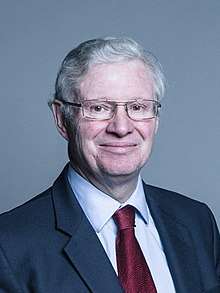Nigel Crisp, Baron Crisp
Edmund Nigel Ramsay Crisp, Baron Crisp KCB (born 14 January 1952)[1] is a British former senior civil servant in the Department of Health, public policy analyst, and Senior Manager in the NHS. He was awarded a life peerage upon retirement, and sits as a crossbencher in the House of Lords.[2] He works and publishes extensively in global health and international development.
The Lord Crisp KCB | |
|---|---|
 | |
| Chief Executive of NHS England | |
| In office 1 November 2000 – 6 March 2006 | |
| Preceded by | Alan Langlands |
| Succeeded by | Sir Ian Carruthers |
| Personal details | |
| Born | Edmund Nigel Ramsay Crisp 14 January 1952 |
| Nationality | British |
| Children | 2 |
| Residence | Newbury, Berkshire, England |
| Education | Uppingham School |
| Alma mater | St John's College, Cambridge |
Background and personal life
Crisp was educated at Uppingham School and then studied philosophy at St John's College, Cambridge.[3]
Crisp is married with two children,[3] and lives in the countryside near Newbury. His interests include the countryside, gardening and painting.
Career
Crisp joined the NHS in 1986 from a background in community work, where he worked in Liverpool and Cambridgeshire, and industry and (from 1981 to 1986) was Secretary and Director of Age Concern Cambridge.[4] He then became the General Manager for Learning Disabilities in East Berkshire and moved in 1988 to become General Manager (and later Chief Executive) of Heatherwood and Wexham Park Hospitals which provided a wide range of general hospital and mental health services in East Berkshire. He moved to Oxford in 1993 to become Chief Executive of the Oxford Radcliffe Hospitals NHS Trust which at the time incorporated the John Radcliffe and Churchill Hospitals and is one of the largest academic medical centres in the country. Crisp became South Thames Regional Director of the NHS Executive in 1997 and London Regional Director in 1999.[3]
Crisp was appointed as the fifth Chief Executive of the NHS and Permanent Secretary at the Department of Health on 1 November 2000. He is unlike his predecessors or successor in combining these posts. On 8 March 2006 Crisp announced his intention to retire at the end of March, acknowledging the current financial problems of parts of the NHS as a disappointment. He was praised by the Prime Minister, Tony Blair, for his contribution to British healthcare and was created Baron Crisp, of Eaglescliffe in the County of Durham, on 28 April 2006.[5][6] He was replaced by Sir Ian Carruthers, as acting NHS Chief Executive, and Hugh Taylor, the Director of Strategy and Business Development, as acting Permanent Secretary. He is currently an advisory council member at The College of Medicine.[7]
In 2016, a biography of Tony Blair – Broken Vows: Tony Blair, The Tragedy of Power by British author Tom Bower, reported Ken Anderson's comment "Crisp had no control over costs and didn’t have a clue what to do", following the former's investigation into why the NHS accounts were six months late. Bowers describes that after an assessment by management consultants McKinsey & Company, Tony Blair and Secretary of State for Health Patricia Hewitt decided Crisp should be replaced, and part of the method used to induce Crisp to resign at age 54 was to award him a life peerage.[8]
Global health and international development
Nigel Crisp has been very active in global health and international development since 2006; most notably publishing in 2007 Global Health Partnerships - a report for the Prime Minister on what more the UK can do to support health improvement in developing countries; co-chairing, with Commissioner Bience Gawanas of the African Union, a Task Force on scaling up the education and training of health workers on behalf of the Global Health Workforce Alliance which resulted in the publication of Scaling up, Saving lives in 2008; and founding, with the Zambian Ministry of Health, The Zambia UK Health Workforce Alliance in 2009. He writes and speaks widely on global health and his book Turning the world upside down - the search for global health was published in 2010.
He chairs Sightsavers International, co-chairs the All Party Parliamentary Group on Global Health,[9] is a Senior Fellow of the Institute for Healthcare Improvement, a Distinguished Visiting Fellow at the Harvard School of Public Health and an Honorary Professor at the London School of Hygiene and Tropical Medicine.[2]
Honours
He was appointed Knight Commander of the Order of the Bath (KCB) in the New Years Honours 2003.[4]
Books
- Crisp, N. Turning the world upside down - the search for global health in the 21st Century, Hodder Education, 2010
- Crisp, N. 24 hours to save the NHS: The Chief Executive's account of reform 2000 - 2006, Oxford University Press, 2011
- Crisp, N. & Omaswa, F (ed.) African health leaders: Making change and claiming the future, Oxford University Press, 2014
Arms
|
References
- Debretts, The Rt Hon the Lord Crisp, KCB Archived 6 September 2012 at the Wayback Machine, accessed 12 May 2011
- NigelCrisp.com, Nigel Crisp: Lord Crisp KCB
- The Guardian, 22 November 2000, "The CV that got Nigel Crisp the top job in the NHS"
- The Guardian, 21 November 2003, Sir Nigel Crisp
- https://www.thegazette.co.uk/Edinburgh/issue/26038
- Life baronies, The Times, 16 May, 2006. Retrieved 18 November 2018
- Archived 5 March 2011 at the Wayback Machine College of Medicine biography
- Bower, Tom (2016). Broken Vows : Tony Blair : the Tragedy of Power. Faber & Faber. pp. 444–456. ISBN 9780571314201.
- APPG on Global Health website: http://www.appg-globalhealth.org.uk
External links
- Nigelcrisp.com, Personal website
- Nigel Crisp, Reforming the Global Health System: Lessons from Asia (Asia Policy, July 2010)
| Orders of precedence in the United Kingdom | ||
|---|---|---|
| Preceded by The Lord Davidson of Glen Cova |
Gentlemen Baron Crisp |
Followed by The Lord Lee of Trafford |